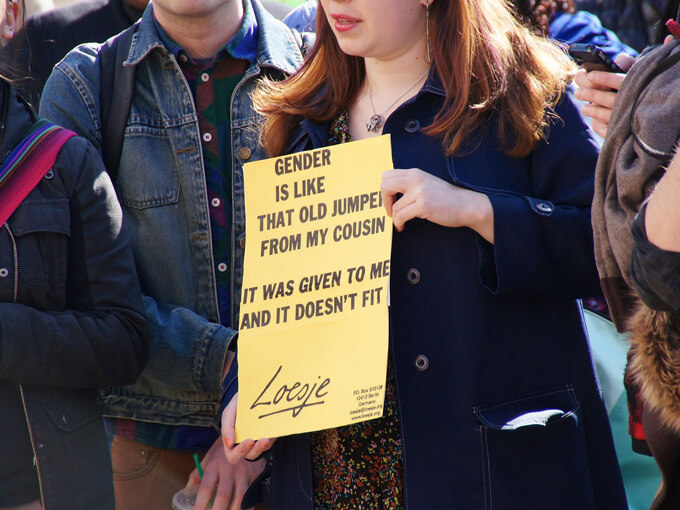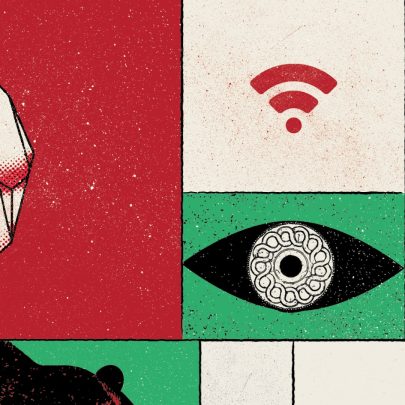Nov 7, 2019 Society
Trans exclusionary or “gender critical” feminists are a particularly dogmatic group of political ideologues – it’s quite uncommon for people who publicly ascribe to the ideology to later publicly denounce it. Metro’s digital editor Tess Nichol talked to someone who did.
A perhaps embarrassingly naive view I hold about the world is that things are always on an upward trajectory; that life is only going to become better, kinder, more progressive. It sometimes feels easy to kid yourself that social issues like sexism, racism, or homophobia are fixed points we are gradually, sometimes too slowly, but nevertheless surely moving away from. That’s why certain opinions are called backwards, right?
The most recent reminder of the truth – that hard-won ground can be lost in the fight for social justice – was the seemingly out-of-nowhere rise of anti-trans rhetoric from trans exclusionary radical feminists (TERFs)* in New Zealand.
The catalyst appears to be a proposal to amend the Births, Deaths, Marriages and Relationships Registration Act, raised late last year. A small but very vocal group of activists campaigned hard to defeat the bill, which was deferred in February this year, with Internal Affairs Minister Tracey Martin citing a lack of public consultation.
To be clear, it is already possible to legally change your gender in New Zealand. The proposed amendment would make the process for changing a person’s gender on their birth certificate a case of self-declaration, rather than a Family Court process, drastically simplifying the process and bringing it in line with drivers’ licenses and passports. Arguments against simplifying the process mainly rest on purported fears for cis women’s safety in places like bathrooms and changing rooms (where you are not asked to provide a birth certificate upon entry). An in-depth and thorough piece of reporting by Susan Strongman for Radio New Zealand covering the ins and outs of the debate as it stood in February can be read here.
A quirk of TERF ideology is how completely it seems to consume many of its acolytes. Many of the most vocal TERFs on Twitter seem to speak of nothing else, doubling and tripling down like a Reductress headline come to life. It also appears to be uncommon amongst many vocal anti-trans activists to change their minds – even when it destroys their reputation in wider society, like formerly beloved UK comedy writer Graham Lineham. Metro understands Herald columnist Rachel Stewart recently quit her gig at the paper following disagreements over a piece she’d written discussing Massey University’s cancelling of the event ‘Feminism 2020’ (run by Speak Up for Women, local campaigners against self-identification) due to “health, safety and wellbeing obligations”.
During the fallout from the event’s cancellation last month, Stuff journalist (and author) Philip Matthews used Twitter to essentially take back previously held views on the issue, which were supportive of TERF positions, and denounced the movement as one which was cult-like, destructive and hostile.
It was an unusual move. What prompted the apology? What changed his mind? And why is his move away from TERFdom so unusual? Matthews explains all (as best as he can) in the Q and A below.
How did you become engaged with TERF ideology and ideas?
About a year ago I had to write something brief on the self-ID issue and read a little bit about [Wellington activist] Renee Gerlich’s campaign and then more from people in the UK like Julie Bindel, Helen Lewis, [Australian author] Germaine Greer and Jane Clare Jones. I can’t remember what tipped me towards it exactly but there was something persuasive, I thought then, in the gender essentialist idea. Which I now disagree with.
What felt “right” or persuasive about what you read?
I’m struggling to remember the exact thing, but it was something about male and female being clear biological realities and the concept of a man who felt he was in the wrong body was a logical impossibility (I now understand that’s a metaphor which approximates the way people feel).
The other terrible thing to admit is that there’s something exciting and stimulating about being at the centre of a big drama on Twitter. I said the other day that TERFs were cult-like and I think that’s true. It’s the ‘us against the world’ mentality.
Why do you think one persuasive argument was enough for you to really run with the whole ideology? One theory I have relates to gender being quite a complicated concept to get your head around, and interrogating what it means to be a woman or a man can make people really uncomfortable, because it takes something integral to their sense of self and upends it. The discomfort that creates can lead to some people defensively adopting extreme views based on visceral and emotional reactions.
One of the things that snapped me out of it finally was a video by Natalie Wynn, aka [Youtuber] ContraPoints, titled “Gender Critical”, and she concludes that TERFdom is about the flimsiest cloak of feminist platitudes draped over disgust and hate. The word “disgust” is at the heart of it for a lot of people, even if they are unaware of it or refuse to admit it. A disgust that is prompted by what they see as a rejection of biological norms and the confusion of male and female categories. I’m not saying it was that for me.
Another part of buying into it was the underdog aspect, as I saw it then. The TERFs have been good at portraying themselves as a marginalised, silenced minority with intellectual links back into more respectable feminism. My interest in it happened around the same time that Rachel Stewart was copping a lot of flak for her Herald column, and I saw that as a classic Twitter pile-on or mass shaming and bullying.
One bugbear of mine is the way anyone who disagrees with the ideology, especially if they do so in a way which is rude or uses swear words, is incorrectly labelled as engaging in “abuse”. It’s also a bit eye-roll inducing when any man who disagrees with is labelled a misogynist out of hand. Did you feel a sense of dogmatic parroting of ideas while you were throwing your lot in with them?
A funny thing – when I said the other day that the trans issue isn’t my issue, isn’t my argument, isn’t my concern, meaning I should just butt out, I had someone say that was the definition of white male privilege, the luxury of being above it all.
It took me a while to learn that just because someone is a minority, they are not necessarily the underdog. As for toeing the line, I was an ally briefly, I think. I feel that happens a lot on Twitter anyway. There are people who fell out with me because I had backed the TERF line; we would still have agreed on everything else. Twitter encourages dogmatic thinking, that’s the common complaint, and it may be one reason why the TERFs have thrived there. When I was involved it seemed to be entirely a Twitter thing. There were no conversations about the subject outside it, little interest in the outside world. It seemed to be this issue that existed primarily online.
Can you explain what you mean by it being “a Twitter thing”? Why you think that’s relevant?
It’s that stereotype of Twitter as inherently polarising and argumentative, and highly tribal. Everything on Twitter is political. Without blaming algorithms or whatever, you feel like you are pushed from the middle, towards the edge. But that might also be a cop-out.
I came to see how dependent the TERF community is on Twitter. It’s a selling point that, for example, Meghan Murphy is banned from Twitter. That makes her a real true believer or martyr. The best get banned.
Even now, whenever I mention TERFs, I get days of notifications, likes, retweets, from scores of people, especially in the UK. I’ve never seen an issue with such an active, connected online network. I also realised that the TERF community here is small, but the UK one is large and plugged in, so they came charging in like the cavalry. In the UK, TERFdom is centred on academics, especially feminists and philosophers, so it also taps into those arguments about free speech and deplatforming in universities. Here, it’s off campus, which is also interesting. It’s more intellectually marginal.
When did you start having misgivings and what were they? How did they mount and ultimately what was the final straw?
I had been in Twitter stoushes and pile ons before, so that was nothing new, but this was much more intense. I didn’t like the tenor of the argument, the way that TERFs seemed to hound and victimise critics; or the single mindedness of their world view, the obsessiveness of it. I started to doubt the alarmist claims about men in women’s changing rooms and prisons, and started to see them promote conspiracy theories about pedophiles. I’m old enough to remember homosexual law reform in the 1980s when there were similar threats about “where all this would lead” – or that gay marriage would lead to people marrying their pets.
A friend of mine said if you want to assess the quality of a new (as it was to me) argument or belief, see who else it attracts. Besides the legit feminists, there were men’s rights activists, Jordan Peterson fans, free speech nuts, Quillette readers. The stories these supposedly left-wing activists were sharing were coming from the Spectator and the Daily Mail. It started to look like a convenient cause for misogynists who never had strong feelings about, say, women’s participation in sport before.
I’m also a big David Lynch fan. There is a great moment in Twin Peaks: The Return where Gordon Cole, played by Lynch, is talking to David Duchovny’s trans character. He says something like “when you became Denise, I told all of your colleagues, those clown comics, to fix their hearts or die”. There was a lack of compassion amongst those in the movement.
That lack of compassion is what’s so galling. TERFs seem to forget there are real people at the heart of their arguments. They’re often extremely cruel in the way they talk about trans people, even when they claim not to be transphobic.
The lack of compassion, again to blame Twitter, is a lot to do with being online, conversing with others who often use pseudonyms and discussing people who are abstractions to you. They’re not treated as people who are trying to live full lives and mind their own business. If they were in the room with you, would you say what you said? Probably not.
When were you inclined to listen to people who disagreed with you while being on board with TERFy ideas – either real life friends or people online who were asking you to pull your head in? If someone is reading this and wants to confront someone in their life who is currently down the TERF rabbit hole, how would you suggest approaching them, based on your experience?
If someone’s deep in the TERF rabbit hole, I don’t know. Maybe that Natalie Wynn video helps? I’m an outlier. Most TERFs are women, I assume, mostly lesbians. Their perspective is utterly different to mine.
The cruelty was real, though. When I saw all the stuff flare up the other week about Massey and Stand Up for Women, I felt like I wanted to say something. It was a bit self-indulgent, and I didn’t expect many people to really care, but I wanted to say “I changed my mind” and apologise to those who felt genuinely hurt. I know some did. We can think Twitter arguments are just a game, or fun, especially if we are relatively privileged, but they can be genuinely hurtful for others reading it.
What would you suggest or say to people grappling with how they feel about gender identity issues – I don’t mean grappling with their gender identity, but who perhaps feel convinced or at least not unconvinced by TERF arguments?
They should maybe read more and talk less. We don’t have to have opinions on everything. Listen to or read about the actual lived experience of people.
*Many TERFs now reject this label and prefer to use the term “gender critical feminists”. It has been alleged the term TERF is a slur, and abusive. However the acronym was used for a long time by those who agreed with the political philosophy to self-identify. Although it is often used by critics of the movement, often in highly critical or even aggressive contexts, Metro does not agree it is a slur, and is a more accurate description of the groups’ politics than Gender Critical feminism.






